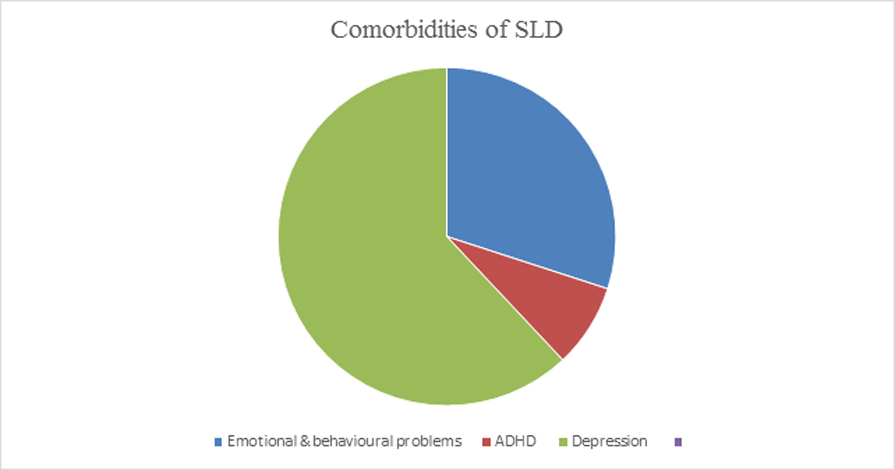In this COVID scenario, most of the parents come to me saying their child has difficulty in understanding spellings, difficulty in reading, writing and calculations.
Is the concept of Specific Learning Disability (SLD) still an unknown area between the common men?
A child with SLD is portrayed up as a “lazy child” when his school teachers complain about his poor academic performance, or when is found inattentive in class, or reaches in his higher secondary. But does this problem start very late? Can we identify the child’s problem in the preschool level/ in his early schooling itself? The enigma of the child who encounters extraordinary difficulty in learning is not new. Since a child is promoted to next class without the need of minimum passing marks, parents and teachers become unaware and wake up only at secondary levels, and the child’s problem remains unnoticed. Children face difficulty in learning varying in culture, countries and languages.
What is Specific Learning Disability (SLD)?
| ” The main feature of SLD is specific and significant impairment in the development of reading, spelling, writing, or arithmetic skills which is not because of a)mental retardation/ intellectual deficit b)any sensory problems like problem in vision/hearing/writing c)inadequate schooling But has , a)normal intelligence, minimum level of IQ=80 b)performance is minimum of 2 grades below his educational level Some children also do have mixed disorder of scholastic skills which means both arithmetic and reading/ spelling skills are significantly impaired “ |
The spectrum of difficulties and their severity makes diagnosis of SLD extremely difficult especially when they are confounded by factors like varying environment and culture. SLD as all other developmental problems is both a health and an educational issue because of which if neglected, leads to child suffer in all walks of life. The total prevalence rates revealed that one in every five school children have SLD. The multilingual system forces children to learn through a medium other than their mother tongue which aggravates the complexity making the diagnosis extremely difficult. This paves the way to understand the importance of the diagnosis of SLD.
The terms learning disorders, learning disability (LD), and learning difficulty are often used interchangeably but differ in many ways.
Alert!!More conditions with SLD
Children with SLD have higher rates of psychological comorbidities. Approximately 30% of children have behavioral and emotional problems. The comorbidity of Attention Deficit Hyperactivity Disorder (ADHD) in children with SLD varies from 10% to 60%. It was seen that 62% of children with SLD have depressive disorder. Diagnosis at an early stage would help in the prevention of many mental illnesses in children.

Undetected and unmanaged SLD
In cases of negligence of the SLD, a child may end up in having chronic scholastic difficulties, dropouts, emotional problems such as depression/anxiety, behavioural problems like conduct issues/anger, substance abuse and poor quality of life in family.
Most of parents have inadequate knowledge and information of SLD, which ends up in delay in recognition of SLD. Most of the parents do not try to pay attention to the child’s problem. They do not focus on remedial intervention. These usually lead to many behavioural and emotional turmoil in children. They are labelled as dull, lazy, mischievous, and so on without knowing the actual reason behind this. Family needs to invest lot of time and energy for these children. Instead of taking SLD as burden and shame it has to be well accepted by the family and support the child to overcome this condition.
Social factors play a very important role in the overall course of illness. Acceptance from friends, and teachers, play very significant role in helping the child with SLD. Lack of information among them, their attitude about the SLD children matters a lot in supporting a child with SLD.
Prevention and Management
Despite the fact that millions of people around the world suffer silently from SLD, there remains widespread confusion and misinformation with regard to identification of and interventions for SLD. Due to this, children do not enjoy their school life and stop going to school. All teachers must be motivated to put extra effort to help these students. Teachers follow different teaching methods and styles from school to school. Few schools focus on teaching phonetics while some adopt the traditional rote learning pattern in which the child learns the alphabets without understanding their formation and sound. Mugging up learning pattern helps only in temporary satisfaction, ignoring the overall development of the child. Multisensory teaching aids, visual and auditory cues, computer software providing text‑to‑text and speech‑to‑text capabilities, and so on can be provided to improve the quality of teaching practices. Intervention at school including remedial training, and teachers’ training is important.
Building family and social support to these affected children is important. If parents successfully identify their child’s needs that can be integrated in helping the child. Instead of SLD remaining undiagnosed and untreated for a longer period of time, it is the need of the hour to address this issue. Child’s problems aggravate because parents do not bother until the child fails. Having a thorough insight into the overlapping areas, can clear the misconceptions, and shall guide assessment, intervention, and welfare benefits to these children who genuinely deserve them.
If your child has been suffering from SLD, do not ignore the symptoms. Visit us today for the right guidance and treatment.



Ms. Lakshmi Saranya Marath, Clinical Psychologist
